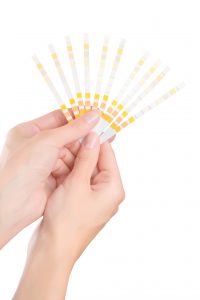A needle exchange program in the Bronx, New York is stepping up to combat the ongoing opioid crisis and rising overdose death rates. Their latest tactic is handing out fentanyl test strips to heroin users.
The reasoning behind the test strips is to lower overdoses due to fentanyl-laced heroin.
Staff member Van Asher explains that the test strips will help addicts determine whether or not there is fentanyl is the drugs they’re using. The strips are usually used to drug test urine, but people can put a little of the mixture that’s in their syringe onto the strip to test whether or not what they are injecting contains fentanyl. This will help them make a more informed decision about what they are putting in their bodies, Asher explained to NPR.
Studies conducted by the Centers For Disease Control and Prevention revealed that most people do not know whether the heroin they’re using contains fentanyl. Asher told NPR that he started handing the strips out of desperation to curb the overdose rates among his clientele.
With each strip, Asher gives a survey to fill and report back. Unfortunately, Ashley admits getting clients to follow through is a difficult task.
Still, Asher is now working with programs around the country to try to replicate his idea. The idea originated at Inside in Vancouver Canada, North America’s only safe injection facility.
However, the major difference is that if someone is choosing to use their fentanyl-laced heroin at Inside, they can be medically monitored and an overdose is more likely to be reversed by staff, preventing death.
In the United States, safe injection facilities do not exist yet. While there are few areas testing the concept, none have yet to become established. Furthermore, harm reduction strategies remain a controversial topic. Therefore, it is up to the drug user to monitor how they use the drugs.
Some simply are not convinced.
Drug users like Vincente Estema explain that knowing there is fentanyl in his heroin is not going to stop him from using.
“It’s stronger! If it makes me feel the euphoria, I’m going to go for it,” he told NPR.
When an addict is at the point of wanting to use drugs, it is unlikely that the fentanyl test strips would deter them from using. However, it would at least inform them of the risk they are taking, and could potentially reduce the amount of the drug they take.
In 2015, the spike in fentanyl-laced overdose deaths led the Drug Enforcement Administration to issue a nationwide warning about the drug.
“Drug incidents and overdoses related to fentanyl are occurring at an alarming rate,” said DEA Administrator at the time, Michele Leonhart, calling it a “significant threat to public health and safety.”
During a three-month period in 2016, 74% of opioid overdoses in Massachusetts were caused by fentanyl! Fentanyl is up to 100 times stronger than morphine and is the strongest opioid available to doctors; even worse, different variations of fentanyl are hitting the streets like carfentanil and acryl fentanyl.
The numbers from Massachusetts indicate that heroin overdoses are dropping, but opioid-related overdose deaths continue to increase. Authorities agree that fentanyl is to blame. In a press release, Massachusetts Secretary of Health and Human Services Marylou Sudders called the data, “a sobering reminder of why the opioid crisis is so complex.”
Do you believe these strips could help combat the opioid epidemic? Would it affect how an addict uses? Regardless, any addict continues to use needs to seek help instead. The next time you use could be your last. Recovery is possible. We want to help you. Call now.


